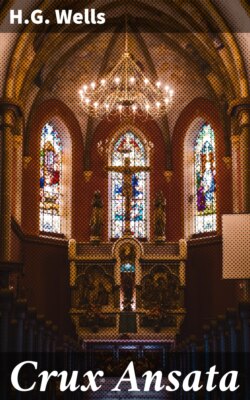Читать книгу Crux Ansata - H.G. Wells - Страница 8
На сайте Литреса книга снята с продажи.
V. — THE CITY OF GOD
ОглавлениеTable of Contents
So the intolerance of the Catholic Church drove steadily towards its own disruption. Nevertheless for nearly a thousand years the idea of Christendom sustained a conception of human unity more intimate and far wider than was ever achieved before.
As early as the fifth century Christianity had already become greater, sturdier and more enduring than any empire had ever been, because it was something not merely imposed upon men, but interwoven with their deeper instinct for righteousness. It reached out far beyond the utmost limits of the empire, into Armenia, Persia, Abyssinia, Ireland, Germany, India and Turkestan. It had become something no statesman could ignore.
This widespread freemasonry, which was particularly strong in the towns and seaports of the collapsing Empire, must have had a very strong appeal to every political organiser. The Christians were essentially townsmen and traders. The countrymen were still pagans (pagani = villagers).
"Though made up of widely scattered congregations," says the Encyclopaedia Britannica in its article on "Church History", "it was thought of as one body of Christ, one people of God. This ideal unity found expression in many ways. Intercommunication between the various Christian communities was very active. Christians upon a journey were always sure of a warm welcome from their fellow disciples. Messengers and letters were sent freely from one Church to another. Missionaries and evangelists went continually from place to place. Documents of various kinds, including gospels and apostolic epistles, circulated widely. Thus in various ways the feeling of unity found expression,, and the development of widely separated parts of Christendom conformed more or less closely to a common type."
Ideas of worldly rule by this spreading and ramifying Church were indeed already prevalent in the fourth century. Christianity was becoming political. Saint Augustine, a native of Hippo in North Africa, who wrote between 354 and 430, gave expression to the political idea of the' Church in his book, The City of God. The City of God leads the mind very directly towards the possibility of making the world into a theological and organised Kingdom of Heaven.. The city, as Augustine puts it, is "a spiritual society of the predestined faithful, but the step from that to a political application was not a very wide one. The Church was to be the ruler of the world over all nations, the divinely-led ruling power over a great league of terrestrial states.
Subsequently these ideas developed into a definite political theory and policy. As the barbarian races settled and became Christian, the Pope began to claim an overlordship of their Kings. In a few centuries the Pope had become in Latin Catholic theory, and to a certain extent in practice, the high priest, censor, judge and divine monarch of Christendom; his influence, as we have noted, extended far beyond the utmost range of the old empire. For more than a thousand years this idea of the unity of Christendom, of Christendom as a sort of vast Amphictyony, whose members even in wartime were restrained from many extremities by the idea of a common brotherhood and a common loyalty to the Church, dominated Europe. The history of Europe from the fifth century onward to the fifteenth is very largely the history of the failure of this great idea of a divinely ordained and righteous world government to realise itself in practice.
